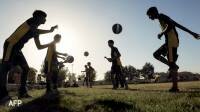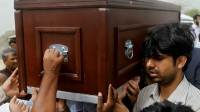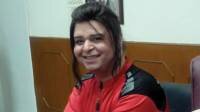At the moment they are basking in their new found glory. The nine teenagers who secured the bronze medal in the Street Children World Cup 2014 have met the charming Bilawal Bhutto Zardari, been guests at the Sindh Assembly and visited the Muttahida Qaumi Movement headquarters at Nine Zero.
Theirs is a story which begins from rags and ends up in riches. Politicians have laden them with cash prizes. Pakistan People’s Party leader Faryal Talpur promised them Rs 100000 each, Pakistan Tehrik-e-Insaf parliamentarian Khurram Sher Zaman announced Rs10000 each for them and the MQM top leadership distributed Rs 25000 each to them.
More awaited at the Sindh Assembly where they were guests for a day. A special package was announced for them, which included cash prizes worth Rs200000 each, an additional Rs500000 for the team and free education up to postgraduate level.
But Sameer Ahmed, the young captain of the team does not want to go to school. He spends his days loitering around the streets on a motorbike, staying out late with friends, seeming to enjoy his freedom.
“I want him go to university. But he’s not interested. He never went to school. He only knows how to read the Quran,” said Sameer’s mother Ayesha.
Ayesha is happy that her son has become a hero at Mauripur, where they live. When he returned from Brazil the neigbhours, relatives and media men poured into her house. The family slaughtered a goat and threw a feast.
But Ayesha worries about his future. “I don’t mind if he keeps playing football. He should play for Pakistan. But if you take football from his life he will fall in bad company again,” she said.
Sameer on the other hand cannot care less. He’s young and for him the sky is the limit. He dreams big. “We played against 19 countries. When we lost the semi-final the boys were low. Some of them were crying. But I told them we defeated India and America. We were taking a bronze medal home. That cheered them up.”
For him that day at the airport when they returned to Pakistan sporting their team shirts was a dream come true. “So many people came to receive us. All of my family turned up. I was never their favourite son. I would often run away from home. When my mother lectured me I shouted at her,” said Sameer.
Unlike his team captain, Ovais Ali, 15, will start class nine at school. As a street child he stayed away from home for six years. “I hated home because my father was strict. Sometimes when I was naughty he would beat me up.”
Ovais lived on the streets for a whole year. He would eat at the various free food outlets and eke out a living doing odd jobs. One day through Azad Foundation, a not for profit organization which works with street children, he reached a rehabilitation centre at New Karachi, a working class neighbourhood. “Here I received shelter from the predators that roam the streets of Karachi. They introduced me to books. A psychologist counseled me. Gradually I agreed to visit my mother at the centre.”
With time he was ready to visit home sometimes. When the Azad Foundation began a selection camp for young footballers Ovais was excited. “I am glad I trusted myself. I got to see Rio de Janeiro. I interacted with so many countries.”
He finds it funny that even the Indian team did not speak Hindi. “They were Tamil. So we ended up talking in sign language with them too.”
For him the crowning glory of the tournament was beating India by 13-0. “You know what they say, beating India is more important than winning the semi-final.”
The boys lived in a camp in Brazil. They shared a mess with other teams. And when they won a match they would run around the whole football ground, dance and wave the Pakistani flag.
“It’s a great feeling,” said Ovais, “Before I went to Brazil no one knew me in my neighbourhood. Now people wait for me to return home. They want to know who I met every day. They’re interested in my life.”
Ovais wants to study further, get into college and earn a professional degree. “After that I want to serve organizations like Azad Foundation who help children like me.”
The team coach Abdur Rashid ground the boys to perfection. From a three month camp attended by 100 boys, all of them linked to the street in some way, he managed to select nine bright gemstones. Then he polished them to perfection.
He did a good job, because the boys proved their mettle. “My boys have done me proud. There were so many teams, my boys did not speak English, yet their confidence was unparalleled. If they were scared it never showed on their faces.”
Rashid has received a permanent job in the social welfare department. He doesn’t know the job description yet, but he is happy at the recognition he received.
Meanwhile officials at Azad Foundation are brimming with requests from journalists, television show hosts and politicians, all of whom want to meet the team. The young sportsmen have been to television studios for morning shows, addressed a press conference at the Karachi Press Club and given scores of interview.
At a dinner held for the teenagers and their parents at a rehabilitation centre run by the Azad Foundation, the not for profit organization announced a bigger tournament next time around. “We will hold a national training camp, go all around Pakistan, hold training sessions and hunt talent from around the country. The best of the country will represent Pakistan in the next World Cup,” said Naveed Khan, CEO Azad Foundation.
Talking about the team’s lack of interest in formal schooling, he said, “You can’t take a child back to school after seven to eight years of school drop out. None of the team members, except one has ever attended formal school. Most of them dropped out in their first year.”
“What the government could do is to arrange some sort of vocational training for them through which they can earn a respectable livelihood,” said Khan.
The writer is a journalist based in Karachi.

























